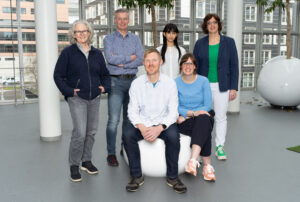Introduction
At the Amsterdam University of Applied Sciences (AUAS), we educate tomorrow’s professionals in a wide array of fields and disciplines of higher education. With our distinct focus on applied sciences, AUAS enables students, lecturers and researchers to develop cutting-edge – and practical – knowledge and innovations. AUAS is a large Higher Education Institution in the capital city of the Netherlands, which consists of seven faculties. We have a total of around 48,000 students and 3,300 (fte) staff members.
Who is involved in the IDEEC project?

- Inky Bruynse – Experienced educator and researcher. Leads Work package 4, knows all about impact measurement.
- Eric-Jan Ritsema – Controller. Makes sure all the numbers are correct and financial reporting is accurate.
- Aya Bennis – Student at University of Amsterdam. Students assistant for IDEEC project, currently on exchange.
- Ingrid Wakkee – Professor of Entrepreneurship, scientific director Centre for Economic Transformation. Keeps an eye on the project content and progress.
- Maarten Hogenstijn – IDEEC project leader, researcher and teacher in social entrepreneurship. Tries to make sure the project runs smoothly.
- Claudia Cuypers – Research and Education officer impact-driven entrepreneurship. Connects the project to the ecosystem and beyond.
What motivated your organisation to participate in the IDEEC project?
At AUAS Centre for Economic Transformation, we believe a shift in economic thinking and acting is necessary. Entrepreneurship can play a crucial role in the transformation towards a fair and sustainable economy. We need to educate the leaders of tomorrow about impact-driven entrepreneurship. We try to do so ourselves at the level of higher education, but are convinced this should be included at all education levels. So… where better to start than with children and young people?
What positive impacts do you foresee the IDEEC project having on education and the next generation of entrepreneurs?
The children and young teenagers of today face grand challenges: the climate crisis becomes more urgent every day, and social challenges like inequality are increasingly pressing. The project ‘Impact-Driven Entrepreneurship Education for Children’ (IDEEC) is focused on educating children to face the environmental and social challenges around them, by developing entrepreneurial skills which they can use as a ‘force for good’.
How has collaborating with other organizations in the IDEEC project enriched your perspective or approach to impact-driven entrepreneurial education?
If you deal with impact-driven entrepreneurship education, you get inspired by enthusiastic young people developing fantastic new ideas, as well as by motivating educators, who want to change the world. While all do so in their own context and from their own perspective, it is great to see a shared vision about a new role of entrepreneurship in the economy of the future.
How do you think interested individuals or organisations can engage with your organisation’s work beyond the IDEEC project?
We need to equip our future leaders with knowledge and competences that allow them to find entrepreneurial solutions to grand challenges. The IDEEC project provides a baseline and a set of practical building blocks for teachers to apply effective programs that help children develop impact-driven entrepreneurship competences. By showing the potential of such programs, educational and economic policy makers are equipped to build policies to support impact-driven entrepreneurship education.
Four words to describe impact-driven entrepreneurial education:
Social value
Connection
Mutual learning
Collaboration
